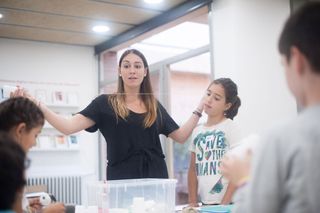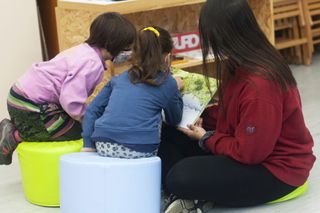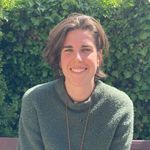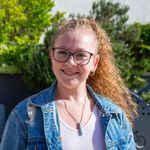- The Faculty of Education, Translation, Sport and Psychology offers future teachers the opportunity to immerse themselves in the professional situation within the framework of university teaching, beyond the established practicum periods
- All Vic’s schools are the ideal space for participation to encourage learning and improve the training of future teachers
Vocation and profession are the two key aspects that must come together in those who want to pursue a career in teaching. Vocation should be integral to any teacher training student. However, a profession is something that must be acquired with experience and practice, as you stand in front of a class, learn to act as a teacher and understand, in short, what it really means to “be a teacher”. This is how teaching identity is constructed, a concept that serves to explain how social and educational changes lead to changes in the conception that teachers themselves have about their work.
To ensure quality initial training for future teachers, the Faculty of Education, Translation, Sport and Psychology (FETEP) adopted a strategic commitment in 2018 to strengthen and combine approaches between academia and the professional environment, in relation to competencies and the professional profile of future teachers. According to the Dean of the Faculty, Eduard Ramírez, “with this commitment, we wanted to build bridges and create an atmosphere of mutual work and enrichment with schools, to promote knowledge transfer in both directions: between the research and scientific knowledge of the University, and the professional practice of schools in the surroundings.”
The idea is therefore to offer bachelor’s degree students of the degrees in Early Childhood Education, Primary School Teaching, the double degree in Early Childhood Education and Primary School Teaching majoring in the English Language, and the double degree in Physical Education and Sports Sciences and Primary School Teaching majoring in Physical Education various innovative training proposals that allow them to immerse themselves in the professional situation, beyond the practicum periods established in the degrees. This network with the professional environment is fostered in both directions: it can involve students going to schools or institutions through the Mentoring and teacher identity programme, or children and young people from schools can come to the University, through the School and university programme.

Training and innovative proposals that allow students to immerse themselves in the professional situation, beyond the established practicum periods
In this way, schools in the city of Vic have become the ideal space for participation to implement the two training proposals. Through work in the network, they have demonstrated their commitment to contribute along with the University to teacher training. In addition, as the project has been consolidated, schools from other nearby municipalities in the territory joined during the last academic year.
Through work in the network, the schools demonstrate their commitment to contributing to initial teacher training
Contact with the school from day one
Thanks to the Mentoring and Teaching Identity (MID) programme, all first-year students have the opportunity to spend one morning a week throughout the year in one of the 16 schools in Vic. Since the creation of the programme four years ago, and even before then, when it was still a pilot project only for students of the double degree in Early Childhood Education and Primary School Teaching majoring in the English Language, a total of 542 teacher training students have enjoyed this pioneering experience in Catalonia. All these students had the opportunity to put their knowledge into practice during the learning process and thus they got closer to how schools work, and became really immersed in them, under the supervision of the teacher-tutor during the entire academic year.
This MID programme is inspired by the university practicums that are carried out in teacher training degrees in northern European universities. The aim is to move towards the creation of the figure of mentor teacher, who can better support students during practicum periods in schools. For this reason, and in parallel, this programme also strengthens and tightens the relationship between the University and the school, and proposes joint spaces for reflection (seminars) on the profile and competencies that must be developed by teacher training students during their initial training, according to the current situation in schools.

Let the school enter the University and the University, the school
At the same time, the Faculty is carrying out the School and university project, which is converting university spaces, such as classrooms and laboratories, into classrooms for early childhood and primary education. Thus, boys and girls from almost all schools in Vic, in early childhood and primary education, travel one morning or one afternoon a week to the University, for half a semester (between 5 and 9 sessions), to do training activities that have been designed and worked on by teacher training students, focusing on educational innovation and classroom management. These activities are related to reading comprehension, maths, scientific research, music, dramatic expression, English, physical education or social sciences, but also work on literary, artistic and digital resources. Since its launch in 2019, 574 bachelor’s degree students and 959 schoolchildren have been able to participate.
“It is a proposal that inspires all those involved: university lecturers, who have to update the contents and can see future teachers in action managing a real classroom context; the teachers who accompany the children, who witness the innovative training proposals and the way spaces designed for educational purposes are used; the children, who have different experiences to the usual ones in class, and the teacher training students, who go from planning on paper, to managing a real classroom,” said the dean of FETEP, Eduard Ramírez.

“Experiencing the profession in another way”
Mireia Cardona, third year of the bachelor’s degree in Early Childhood Education
“I think the fact that schoolchildren can come to the University is a great opportunity, first of all, because it helps me to find out if what I am studying is really what I want to do. I learn to plan, to know how to react when I meet students with difficulties, to put into practice what I am learning, to have a plan B when I see that what I have prepared for the class does not work, to know how to listen more to children and to understand what they need, and to coordinate with my colleagues. In short, this allows me to experience the profession in a much more hands-on way, which is when you realize that you are really learning.”

"Seeing the classroom through the eyes of a teacher"
Cristina Guasch, first year of the bachelor’s degree in Primary School Teaching
"Going to school one day a week is a unique experience for me and I am very fortunate to be able to start going into classrooms with children from the first year of the degree. Due to this opportunity, we can really find out if this is what we would like to do and if it is what we want to end up doing in the future. I even think that these types of practicum should be compulsory in the first year. Going to primary school classrooms every Tuesday, I could observe how boys and girls behave, and how teachers act in different circumstances.
What I like most is dealing with the students, the moments we share with the tutor and when we exchange opinions, being one more person in the classroom and helping as if I were a teacher. I think it helped me open my eyes and see the classroom from a different perspective. We all have memories of our classes as children. Now I can see them as a teacher. ”